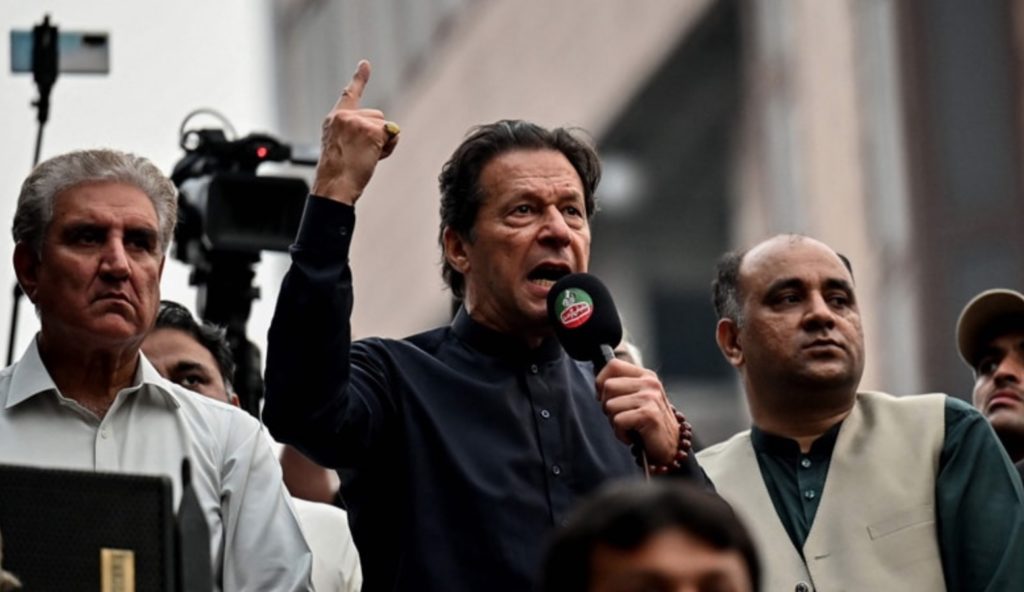Former cricket star Imran Khan had vowed to captain the country a second time after being ousted as prime minister last year, but his conviction for graft Saturday has seen his chances stumped.
He was being taken into custody to begin a three-year jail sentence less than an hour after an Islamabad judge declared him guilty, ahead of elections due by mid-November.
Khan had been expecting a conviction – he faces more than 200 legal cases which he argued were politically motivated and designed to prevent him from standing against the fragile coalition government.
The charismatic 70-year-old remains wildly popular – his first TikTok video last month garnered more than 135 million views in the first 36 hours – but the survival of his Pakistan Tehreek-e-Insaf party is unclear without him at the helm.
Most of his senior leadership are also locked away, or have abandoned the party following a major crackdown by the establishment which has vastly diminished his street power.
Since he was booted from power in April 2022 by a no-confidence vote, Khan has waged a risky and unprecedented campaign of defiance against the military he blamed for stiffing his party.
That anger spilled onto the streets in May after he was arrested and briefly detained in the same case, sparking three days of sometimes violent protests.
He is still recovering from a November assassination attempt which saw him shot in the leg – an attack he blamed on incumbent Prime Minister Shehbaz Sharif and a senior army officer.
The political drama has played out against a backdrop of economic freefall and dramatically increasing militant attacks, ahead of general elections due no later than October.
Khan enjoyed genuine popular support when he became premier in 2018, but critics say he failed to deliver on promises to revitalise the economy and improve the plight of the poor.
He was voted in by millions who grew up watching him play cricket, where he excelled as an all-rounder and led the nation to World Cup victory in 1992.
PTI overturned decades of dominance by the Pakistan Peoples Party and Pakistan Muslim League-N – two usually feuding groups that joined forces to oust him in April 2022.
Khan’s vision was for Pakistan to become a welfare state modelled on the Islamic golden age of the seventh to 14th centuries, a period of cultural, economic and scientific flourishing in the Muslim world.
But he made little headway in improving Pakistan’s financial situation, with galloping inflation, crippling debt and a feeble rupee undermining economic reform.
A deteriorating security situation, particularly since the Taliban returned to power in Afghanistan in 2021, also happened on his watch.
But the crucial blow to his leadership was a reported falling out with the military, the country’s kingmakers who can control the rise and fall of any government.
The Oxford-educated son of a wealthy Lahore family, Khan had a reputation as a playboy until his retirement from international cricket.
For years he busied himself with charity projects, raising millions to build a cancer hospital to honour his mother.
He tiptoed into politics and for years held the PTI’s only parliamentary seat.
But the party grew hugely during the military-led government of General Pervez Musharraf, becoming a genuine force in the 2013 elections before winning a majority five years later.
Running the country proved more difficult than sitting in opposition, however.
Double-digit inflation drove up the cost of basic goods, and Pakistan had to borrow heavily just to service foreign debt.
Married three times, his current wife Bushra Bibi comes from a conservative family and wears a veil in public.
Often described as being impulsive and brash, Khan draws frequently on cricket analogies to describe his political battles.
“I fight till the very last ball,” he said in one TV interview.
© Agence France-Presse







